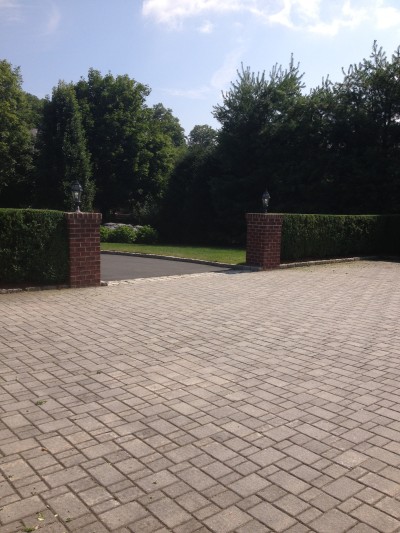
What is the best type of driveway for my home?

- Smooth: This is the most popular and often more desirable choice, especially in areas where there is a lot of snow. Smooth surfaces make snow and ice removal easier. Smooth surfaces such as concrete and asphalt driveways are also less expensive.
- Aggregate: A popular example of an aggregate surface is gravel driveway. It has great appeal, but can be more expensive because of the maintenance involved. Gravel tends to "disappear," often being compacted into the ground, and then needs to be replenished.
Here are popular driveway styles worth considering:
Asphalt. This is cheapest driveway in terms of low installation cost, but it often costs the most to maintain. Asphalt requires resealing every 2 to 4 years, so the extra time and money spent in maintaining it can add up over the years. Jim Stutz, a driveway and blacktop contractor in Trumbull, CT with 33 years of experience says, “All asphalt driveways eventually crack. Most will show some signs of cracking after just a few years. There are several causes for cracks in asphalt driveways, the most common of which are shrinkage, heavy vehicular traffic, a settling or shifting base beneath the driveway and tree roots. Jim also says that there is no cure for the cracks in asphalt and it should be regularly treated, which requires refilling from time to time.
Poured Concrete. This smooth surfaced driveway may cost more to install than asphalt, but it is more durable and entails a smaller amount of maintenance when sealed properly. Concrete driveways have an extra “radiant heating” feature that can be part of the installation and reduce with the amount of ice and snow removal you'll face, making it a safer driveway for your home.
Stamped or Stained Concrete. You can get artistic with concrete by having your installer add a design to it as it's drying. There are many finishes to choose from—patterns that look like slate, wood, flagstone and even brick.

Pavers. Having a paved driveway gives your house great curb appeal, but is the most expensive investment because it requires a lot of material and labor costs. Pavers allow for a variety of designs and details. Keep in mind that if you live in an area where it snows often, paved driveways are more expensive to maintain and may need frequent repair due to plow damage; also, it needs sealing every 2 to 3 years. Your driveway can become a sheet of ice in the cold winter months, but you do have less dirt and dust during the summer.
When working with a driveway professional, consider the patterns they offer, their experience and their design creativity. In terms of when to schedule the job—any driveway job, from maintenance to a complete redo, Jim Stutz recommends spring or summer months because sealer that is able to dry faster thanks to full sun exposure tends to hold up better over time.
Each type of driveway has their own fan base, but the choice is yours to create and design a driveway that is best for your family and your home’s charm.